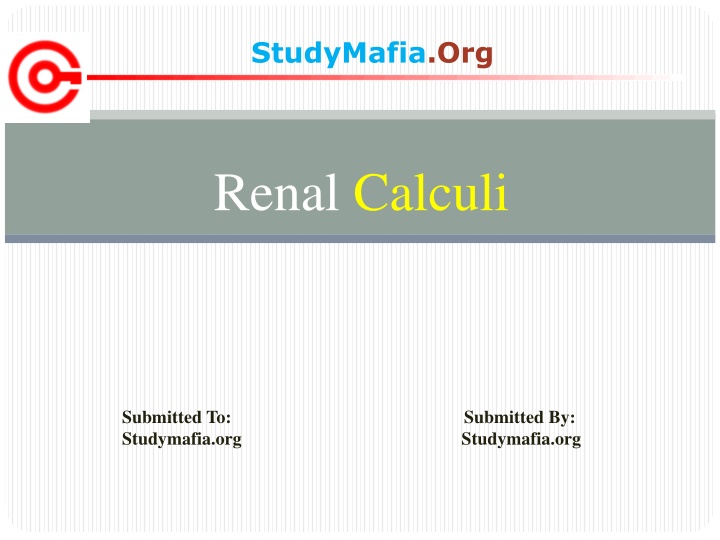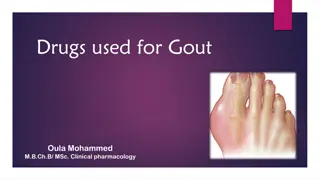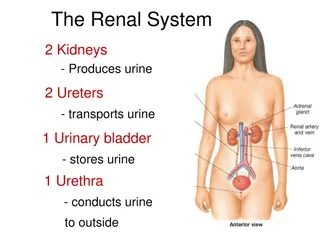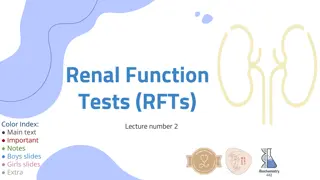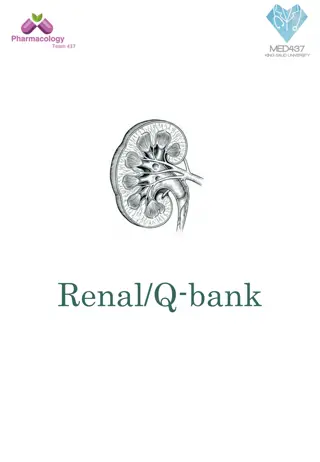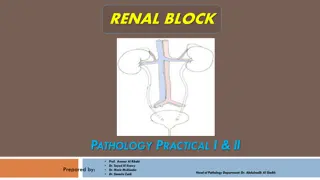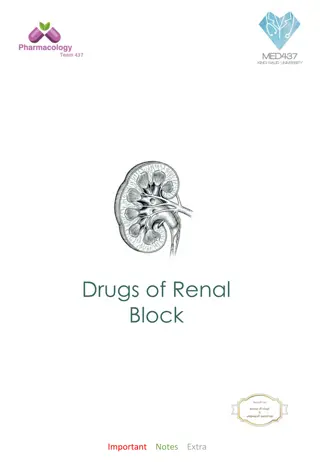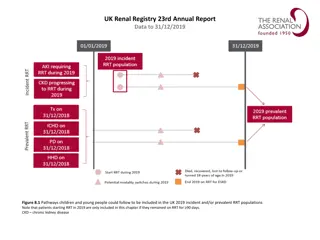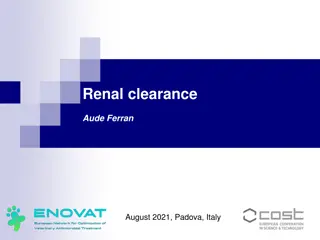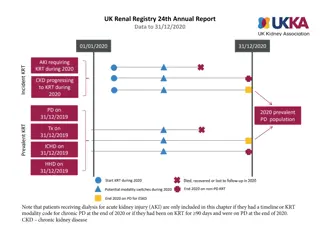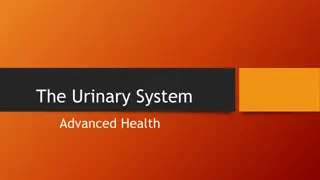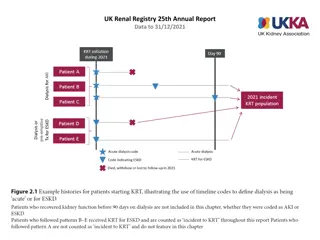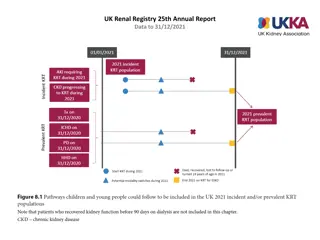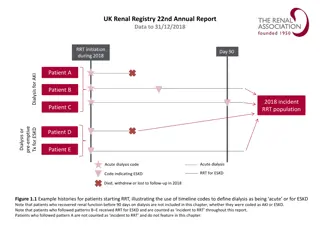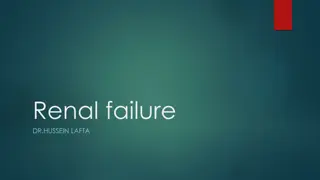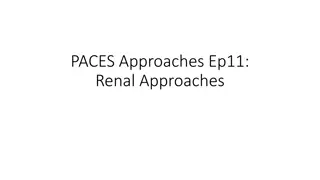Renal Calculi: Causes, Symptoms, and Prevention
Renal calculi, also known as kidney stones, are hard deposits that form in the kidneys. Learn about the causes, symptoms, and prevention methods for this condition to stay informed and take appropriate action when needed.
Download Presentation

Please find below an Image/Link to download the presentation.
The content on the website is provided AS IS for your information and personal use only. It may not be sold, licensed, or shared on other websites without obtaining consent from the author.If you encounter any issues during the download, it is possible that the publisher has removed the file from their server.
You are allowed to download the files provided on this website for personal or commercial use, subject to the condition that they are used lawfully. All files are the property of their respective owners.
The content on the website is provided AS IS for your information and personal use only. It may not be sold, licensed, or shared on other websites without obtaining consent from the author.
E N D
Presentation Transcript
StudyMafia.Org Renal Calculi Submitted To: Studymafia.org Studymafia.org Submitted By:
Table Contents Definition Introduction Symptoms of Renal calculi When to see a Doctor Causes of Renal calculi Types of Renal calculi Risk-Factors of Renal calculi Diagnosis of Renal calculi Prevention of Renal calculi Conclusion 2
Definition Kidney stones (also called renal calculi, nephrolithiasis or urolithiasis) are hard deposits made of minerals and salts that form inside your kidneys. 3
Introduction Diet, excess body weight, some medical conditions, and certain supplements and medications are among the many causes of kidney stones. Kidney stones can affect any part of your urinary tract from your kidneys to your bladder. Often, stones form when the urine becomes concentrated, allowing minerals to crystallize and stick together. Passing kidney stones can be quite painful, but the stones usually cause no permanent damage if they're recognized in a timely fashion. Depending on your situation, you may need nothing more than to take pain medication and drink lots of water to pass a kidney stone. In other instances for example, if stones become lodged in the urinary tract, are associated with a urinary infection or cause complications surgery may be needed. 4
Symptoms of Renal calculi A kidney stone usually will not cause symptoms until it moves around within your kidney or passes into your ureters the tubes connecting the kidneys and the bladder. If it becomes lodged in the ureters, it may block the flow of urine and cause the kidney to swell and the ureter to spasm, which can be very painful. At that point. Pain caused by a kidney stone may change for instance, shifting to a different location or increasing in intensity as the stone moves through your urinary tract. 5
When to see a Doctor Make an appointment with your doctor if you have any signs and symptoms that worry you. Seek immediate medical attention if you experience: Pain so severe that you can't sit still or find a comfortable position Pain accompanied by nausea and vomiting Pain accompanied by fever and chills Blood in your urine Difficulty passing urine 7
Causes of Renal calculi Kidney stones often have no definite, single cause, although several factors may increase your risk. Kidney stones form when your urine contains more crystal-forming substances such as calcium, oxalate and uric acid than the fluid in your urine can dilute. At the same time, your urine may lack substances that prevent crystals from sticking together, creating an ideal environment for kidney stones to form. 8
Types of Renal calculi Knowing the type of kidney stone you have helps determine its cause, and may give clues on how to reduce your risk of getting more kidney stones. If possible, try to save your kidney stone if you pass one so that you can bring it to your doctor for analysis. Types of kidney stones include: Cystine stones: These stones form in people with a hereditary disorder called cystinuria that causes the kidneys to excrete too much of a specific amino acid. 9
Types of Renal calculi Struvite stones: Struvite stones form in response to a urinary tract infection. These stones can grow quickly and become quite large, sometimes with few symptoms or little warning. Uric acid stones: Uric acid stones can form in people who lose too much fluid because of chronic diarrhea or malabsorption, those who eat a high-protein diet, and those with diabetes or metabolic syndrome. Certain genetic factors also may increase your risk of uric acid stones. 10
Types of Renal calculi Calcium stones: Most kidney stones are calcium stones, usually in the form of calcium oxalate. Oxalate is a substance made daily by your liver or absorbed from your diet. Certain fruits and vegetables, as well as nuts and chocolate, have high oxalate content. Dietary factors, high doses of vitamin D, intestinal bypass surgery and several metabolic disorders can increase the concentration of calcium or oxalate in urine. 11
Risk-Factors of Renal calculi Factors that increase your risk of developing kidney stones include: Family or personal history: If someone in your family has had kidney stones, you're more likely to develop stones, too. If you've already had one or more kidney stones, you're at increased risk of developing another. Dehydration: Not drinking enough water each day can increase your risk of kidney stones. People who live in warm, dry climates and those who sweat a lot may be at higher risk than others. 12
Risk-Factors of Renal calculi Certain diets: Eating a diet that's high in protein, sodium (salt) and sugar may increase your risk of some types of kidney stones. This is especially true with a high-sodium diet. Obesity: High body mass index (BMI), large waist size and weight gain have been linked to an increased risk of kidney stones. Digestive diseases and surgery: Gastric bypass surgery, inflammatory bowel disease or chronic diarrhea can cause changes in the digestive process that affect your absorption of calcium and water, increasing the amounts of stone-forming substances in your urine. 13
Risk-Factors of Renal calculi Other medical conditions: such as renal tubular acidosis, cystinuria, hyperparathyroidism and repeated urinary tract infections also can increase your risk of kidney stones. Certain supplements and medications: such as vitamin C, dietary supplements, laxatives (when used excessively), calcium-based antacids, and certain medications used to treat migraines or depression, can increase your risk of kidney stones. 14
Diagnosis of Renal calculi Diagnosis of kidney stones requires a complete health history assessment and a physical exam. Other tests include : Blood tests for calcium, phosphorus, uric acid, and electrolytes Blood urea nitrogen (BUN) and creatinine to assess kidney functioning Urinalysis to check for crystals, bacteria, blood, and white cells Examination of passed stones to determine their type 15
Diagnosis of Renal calculi The following tests can rule out obstruction: Abdominal X-rays Intravenous pyelogram (IVP) Retrograde pyelogram Ultrasound of the kidney (the preferred test) MRI scan of the abdomen and kidneys Abdominal CT scan The contrast dye used in the CT scan and the IVP can affect kidney function. However, in people with normal kidney function, this isn t a concern. 16
Prevention of Renal calculi Proper hydration is a key preventive measure. It s recommended to drink enough fluid to pass at least 2.5 liters of urine each day. Increasing the amount of urine you pass helps flush the kidneys. You can substitute ginger ale, lemon-lime soda, and fruit juice for water to help you increase your fluid intake. If the stones are related to low citrate levels, citrate juices could help prevent the formation of stones. 17
Prevention of Renal calculi Eating oxalate-rich foods in moderation and reducing your intake of salt and animal proteins can also lower your risk of kidney stones. Your doctor may prescribe medications to help prevent the formation of calcium and uric acid stones. If you ve had a kidney stone or you re at risk for a kidney stone, speak with your doctor and discuss the best methods of prevention. 18
Conclusion Renal calculi are a common cause of blood in the urine (hematuria) and pain in the abdomen, flank, or groin. They occur in one in 11 people at some time in their lifetimes with men affected 2 to 1 over women. Development of the stonesis related to decreased urine volume or increased excretion of stone- forming components such as calcium, oxalate, uric acid, cystine, xanthine, and phosphate. 19
References Google.com Wikipedia.org Studymafia.org Slidespanda.com
Thanks To StudyMafia.org
